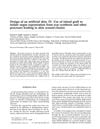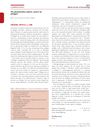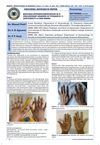 14 citations,
January 2021 in “Scientific Reports”
14 citations,
January 2021 in “Scientific Reports” Using micro skin tissue columns improves skin wound healing and reduces scarring.
 13 citations,
July 2012 in “Pigment Cell & Melanoma Research”
13 citations,
July 2012 in “Pigment Cell & Melanoma Research” A mutation in the Adam10 gene causes freckle-like spots on Hairless mice.
 13 citations,
March 1998 in “Journal of Biomedical Materials Research”
13 citations,
March 1998 in “Journal of Biomedical Materials Research” Island grafts can help study skin regeneration separately from other healing processes.
 12 citations,
January 2019 in “Regenerative Medicine”
12 citations,
January 2019 in “Regenerative Medicine” The document suggests a need for collaboration, better evidence, and a responsible framework to safely and effectively advance regenerative therapies to clinical use.
 10 citations,
November 2015 in “Elsevier eBooks”
10 citations,
November 2015 in “Elsevier eBooks” Modern wound dressings like hydrocolloids, alginates, and hydrogels improve healing and are cost-effective.
 10 citations,
May 2009 in “Sexual and Relationship Therapy”
10 citations,
May 2009 in “Sexual and Relationship Therapy” The document concludes that hormone therapy is essential for treating gender dysphoria, with specific drugs and monitoring protocols recommended for safety and effectiveness.
 7 citations,
July 2018 in “International Journal of Applied Pharmaceutics”
7 citations,
July 2018 in “International Journal of Applied Pharmaceutics” Chitosan nanoparticles are promising for sustained caffeine delivery through the skin.
 7 citations,
January 2017 in “American Journal of Biological Anthropology”
7 citations,
January 2017 in “American Journal of Biological Anthropology” Sardinians were historically short due to a mix of genetics and factors like disease and poor nutrition, but recent height increases suggest better living conditions had a bigger impact.
 6 citations,
September 2012 in “Clinical Interventions in Aging”
6 citations,
September 2012 in “Clinical Interventions in Aging” Honokiol might help reduce male skin aging by maintaining testosterone levels.
 5 citations,
May 2023 in “Frontiers in immunology”
5 citations,
May 2023 in “Frontiers in immunology” Environmental factors like diet and vitamin levels, especially Vitamin D, can affect autoimmune diseases differently, with lifestyle changes potentially improving outcomes.
 3 citations,
September 2000 in “Geriatric nursing”
3 citations,
September 2000 in “Geriatric nursing” Aging men face unique health issues like erectile dysfunction, prostate problems, and baldness.
 2 citations,
May 2011 in “British Journal of Dermatology”
2 citations,
May 2011 in “British Journal of Dermatology” Pellagra, caused by niacin deficiency and presenting with photosensitivity, should be considered in patients with relevant symptoms and risk factors.
 2 citations,
January 1997 in “Principles of Medical Biology”
2 citations,
January 1997 in “Principles of Medical Biology” Drug metabolism affects how long a drug works, its interactions, activation, and toxicity, and is influenced by genetics, diet, illness, and other drugs.
 1 citations,
January 2009 in “Elsevier eBooks”
1 citations,
January 2009 in “Elsevier eBooks” The document concludes that a deeper understanding of skin aging and photodamage is needed to create better skin treatments.

Elastin-like recombinamers show promise for better wound healing and skin regeneration.
 July 2021 in “PARIPEX INDIAN JOURNAL OF RESEARCH”
July 2021 in “PARIPEX INDIAN JOURNAL OF RESEARCH” Knuckle darkening can be an early sign of vitamin B12 deficiency.
 May 2021 in “Journal of the Endocrine Society”
May 2021 in “Journal of the Endocrine Society” The 18-year-old girl likely has a condition called müllerian agenesis, which caused her to not have a uterus and experience no menstrual periods.
 November 2014 in “John Wiley & Sons, Ltd eBooks”
November 2014 in “John Wiley & Sons, Ltd eBooks” Eating high-glycemic and dairy foods can increase hormones that may cause acne and other health issues.

The chapter explains that there are many genetic skin disorders affecting skin cell formation, including both common and rare types.

The document concludes that scientists created various steroids with different properties, including a more effective semi-synthetic vitamin D.
 January 1995 in “Adolescent and pediatric gynecology”
January 1995 in “Adolescent and pediatric gynecology” Mutations in the androgen receptor gene cause different levels of androgen insensitivity, making it hard to create simple tests for the condition.
 January 1983 in “Journal of the American Oil Chemists' Society”
January 1983 in “Journal of the American Oil Chemists' Society” The U.S. soybean industry wanted government help due to foreign competition, while the jojoba industry was growing and expected to stabilize.
 2295 citations,
August 2012 in “The international journal of transgenderism/International journal of transgenderism”
2295 citations,
August 2012 in “The international journal of transgenderism/International journal of transgenderism” The guidelines recommend informed consent for gender-affirming treatments and stress the importance of personalized, culturally sensitive care for transgender individuals.
 883 citations,
August 2016 in “Nature Reviews Disease Primers”
883 citations,
August 2016 in “Nature Reviews Disease Primers” Polycystic Ovary Syndrome (PCOS) is a common condition in women that can cause metabolic, reproductive, and psychological issues, and requires lifestyle changes and medication for management.
 467 citations,
October 2014 in “European Journal of Endocrinology”
467 citations,
October 2014 in “European Journal of Endocrinology” The European Society of Endocrinology advises individualized long-term management for PCOS, focusing on lifestyle changes, accurate diagnosis, and treatments for associated health risks and symptoms.
 451 citations,
March 2005 in “Endocrine Reviews”
451 citations,
March 2005 in “Endocrine Reviews” The enzyme steroid sulfatase is linked to breast cancer and other conditions, and inhibitors are being developed for treatment.
 282 citations,
October 2006 in “The Journal of Clinical Endocrinology and Metabolism”
282 citations,
October 2006 in “The Journal of Clinical Endocrinology and Metabolism” The Endocrine Society advised against routine testosterone therapy for women, citing a need for more research on long-term safety and a clear definition of androgen deficiency.
 266 citations,
November 2013 in “European Journal of Epidemiology”
266 citations,
November 2013 in “European Journal of Epidemiology” The Rotterdam Study aims to understand disease causes in the elderly and has found new risk factors and genetic influences on various conditions.
 238 citations,
July 2003 in “British Journal of Plastic Surgery”
238 citations,
July 2003 in “British Journal of Plastic Surgery” Hidradenitis suppurativa, a chronic skin disease, can be managed with antibiotics, lifestyle changes, and in severe cases, surgery. Early diagnosis and careful planning are key, and laser treatment can be an efficient solution for mild to severe cases.
 220 citations,
March 2020 in “Advanced functional materials”
220 citations,
March 2020 in “Advanced functional materials” Biomaterials with MSC-derived substances could improve tissue repair and have advantages over direct cell therapy.






























